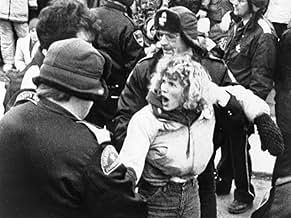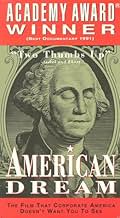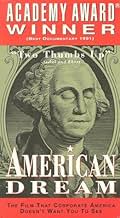IMDb RATING
7.8/10
1.1K
YOUR RATING
Recounts the 1985-86 strike against the Hormel Foods Corporation in Minnesota after its employees' wages and benefits were cut.Recounts the 1985-86 strike against the Hormel Foods Corporation in Minnesota after its employees' wages and benefits were cut.Recounts the 1985-86 strike against the Hormel Foods Corporation in Minnesota after its employees' wages and benefits were cut.
- Won 1 Oscar
- 12 wins & 3 nominations total
Dan Rather
- Self
- (archive footage)
Ronald Reagan
- Self
- (archive footage)
Featured reviews
Barbara Kopple's American Dream is a painful but honest on all sides look at what labor unions have to go through when they go into strike- mode, and how corporations, starting in the 80's, say the unions flaws in negotiating as a means to get in to change things for their benefit. It's that kind of movie though that doesn't discriminate in a key way - I think if you're pro-union or anti-union even, you can get something out of this take by how Kopple presents everything. The characters here all want what's best, but it's not so simple as'let's negotiate a contract'. Sides become fractured, tempers get flared, and a 'labor consultant' arguably muddies the waters early on in the negotiating. By the time it gets to be many weeks into the strike, some of the folks on the picket lines get desperate, cross and go back to work, and the sides become even more fractured.
It's about the Hormel meat-packing district, but the staying power of the film is this: it could be anywhere. Is it just about if wages decrease by two dollars, or four dollars, or about something more when it comes to bargaining, the rights of workers, and who is really in control? The interviews and perspective are in large part on Lewie Anderson, who probably has the most common sense as we can see it (or rather in comparison with the Consultant Ray Rogers, who is technically a corporate guy as well), and how he has to approach the union and the chief committee about where to go with Hormel - and of course the flaws are there, like rewriting the contract that has forty years of bargaining in it for the rights of the workers.
This is not to say that, for the warts-and-all approach Kopple takes, that she is on the side of the corporate masters at Hormel. We see one of their spokesman, who is a down-the-line party guy, talk to the camera(s) with the candor that one expects from such a corporate man about dealing with the union leaders (maybe not as villainous as, say, a Roger Smith from Roger & Me, but what is). But it's mostly there, in those halls and on the picket lines and in those smokey, emotional offices that Kopple takes her sights and tells this story. How it becomes a tale for almost everyone (not to say that, probably, those who have worked in unions or know people who have, that makes up a good lot of Americans, will connect deeper with it) is that it's not about complex legal wrangling. It's about what people do when pushed up against a wall, and put themselves into a war.
It is a complicated tale to tell, that is without easy answers, but by the end you can't say you don't see how things did not turn out well, especially with the greater picture (albeit not shown really or at least on the level of the 'smaller-but-bigger' picture the director paints) that the country was in at the time, and still are. What happens to these Americans, all hard workers, when faced against corporate pressures, and then other workers are brought in across the picket lines. What happens to society?
It's about the Hormel meat-packing district, but the staying power of the film is this: it could be anywhere. Is it just about if wages decrease by two dollars, or four dollars, or about something more when it comes to bargaining, the rights of workers, and who is really in control? The interviews and perspective are in large part on Lewie Anderson, who probably has the most common sense as we can see it (or rather in comparison with the Consultant Ray Rogers, who is technically a corporate guy as well), and how he has to approach the union and the chief committee about where to go with Hormel - and of course the flaws are there, like rewriting the contract that has forty years of bargaining in it for the rights of the workers.
This is not to say that, for the warts-and-all approach Kopple takes, that she is on the side of the corporate masters at Hormel. We see one of their spokesman, who is a down-the-line party guy, talk to the camera(s) with the candor that one expects from such a corporate man about dealing with the union leaders (maybe not as villainous as, say, a Roger Smith from Roger & Me, but what is). But it's mostly there, in those halls and on the picket lines and in those smokey, emotional offices that Kopple takes her sights and tells this story. How it becomes a tale for almost everyone (not to say that, probably, those who have worked in unions or know people who have, that makes up a good lot of Americans, will connect deeper with it) is that it's not about complex legal wrangling. It's about what people do when pushed up against a wall, and put themselves into a war.
It is a complicated tale to tell, that is without easy answers, but by the end you can't say you don't see how things did not turn out well, especially with the greater picture (albeit not shown really or at least on the level of the 'smaller-but-bigger' picture the director paints) that the country was in at the time, and still are. What happens to these Americans, all hard workers, when faced against corporate pressures, and then other workers are brought in across the picket lines. What happens to society?
"American Dream" is a sobering and fascinating documentary depicting the social, economic and emotional ramifications of a labor strike initiated by employees at a Hormel meatpacking plant in Austin, Minnesota. Although the film depicts events that take place in 1986, the content is every bit as relevant today on the subject of the perennial gap that exists between rank-and-file workers and top executives at major U.S. corporations, and the general greed and mercenary attitude that drives said corporations at the expense of hard-working employees. Like "Roger & Me," the acclaimed documentary by Michael Moore that savaged General Motors and the 80's corporate ethos of "profits above everything else," "American Dream" is a priceless portrait of blue-collar work and life in small-town America, the kind of place that people who live in New York, Washington D.C., Los Angeles or any other major metro area will probably never see.
Austin is a town where one company is the largest employer (in this case, the Hormel meat company), on whom generations of workers depend for their livelihood. The film puts a human face on the repercussions that result when Hormel, despite record profits, cuts the salaries of its workers. If the balding, grey-suited, humorless Hormel executives depicted here (wearing huge eyeglasses in the style of Lee Iaccoca) are not the epitome of 80's greed, I don't know what is. They are Gordon Gekko come to life, caring only about their bottom line and how to maximize profit, completely indifferent to the plight of their workers. The Enron debacle shows that, for all their economic might and wealth creation, there is a dark side to corporate America. "American Dream," its ironic title aside, is a journey to that dark side that should be seen by every worker, blue-collar or white-collar. Try to catch it on the Sundance or Independent Film Channel.
Austin is a town where one company is the largest employer (in this case, the Hormel meat company), on whom generations of workers depend for their livelihood. The film puts a human face on the repercussions that result when Hormel, despite record profits, cuts the salaries of its workers. If the balding, grey-suited, humorless Hormel executives depicted here (wearing huge eyeglasses in the style of Lee Iaccoca) are not the epitome of 80's greed, I don't know what is. They are Gordon Gekko come to life, caring only about their bottom line and how to maximize profit, completely indifferent to the plight of their workers. The Enron debacle shows that, for all their economic might and wealth creation, there is a dark side to corporate America. "American Dream," its ironic title aside, is a journey to that dark side that should be seen by every worker, blue-collar or white-collar. Try to catch it on the Sundance or Independent Film Channel.
It may at times resemble an illustrated Bruce Springsteen protest ballad, but the tragedy in Barbara Kopple's Oscar winning documentary portrait of a Minnesota meat packer's strike is too rich to ignore, not unlike the film 'Roger & Me' but without Michael Moore's self-serving humor. The story begins in the mid 1980s, when the Hormel Company in Austin, Minnesota, tried to lower wages despite showing a healthy profit, leading members of Local P-9 to ignore their parent Union and hire an rhetoric spouting outside agitator (labor 'consultant' Ray Rogers), who transformed their grievance into a noble but ultimately self-defeating grassroots crusade. Kopple herself remains more or less invisible throughout the film, but her sympathy for the renegade P-9 underdogs (and her anti-Reaganomics attitude) is obvious, and she reveals the personal and civic consequences of labor disunion with heartbreaking clarity. The strike itself may not have made headlines outside the Mid West, but the story has some devastating implications for organized labor nationwide, and beyond that supplies enough drama and character to match any Hollywood blockbuster.
Remaining in obscurity, this is another Union strike documentary from director Barbara Kopple, the brilliant filmmaker who brought us the landmark masterpiece documentary "Harlan County, USA", this time chronicling a strike of meat-packers in Austin, Minnesota -- around the time where Reagan put the clamp down on Unions, with his decision to fire the striking air-traffic controllers. Is it as great as "Harlan County, USA"? No. Is it worth seeing? Most definitely, especially for those who were fans of the previously mentioned film, for while it is not on the same level, American Dream is a very fine film in its own right, bringing some more interesting things to the table.
It starts a little slow, and I am not sure how relevant the film remains today, but it slowly becomes more and more absorbing. If Kopple's previous film, 14 years earlier, was a profound documentation of the power of the working class and the success of the Unions and people working together -- then "American Dream" is a documentary about the FAILURE of the Unions. This is a rather bleak film, augmented by the shots of the snow-covered, frozen land of Minnesota winter, giving the film at times a very cold mood. I would say that this film, although obviously taking sides with the strikers, is fairly even-handed. More importantly, however, it shows the major divisions in the Unions in how to achieve their goals and how to avoid the worst outcome, which is everyone losing their jobs and in essence being crushed by the companies.
As in "Harlan County, USA", the film is at its best when dealing with individual dramas and human moments between the people. While Kopple does offer some occasional narration and an added musical score, her presence is often unseen, allowing the people to tell the story, with the drama ultimately being created by the film's editing. We essentially see how the people of the Union, from the top down, are basically torn apart as their cause becomes more and more hopeless. How people of the community have to pick between crossing the picket line and reviving their job, or keeping their promises and integrity to the Union and to the community. We see people in heated arguments, we see people in brawls, best friends against best friends, brothers against brothers. There are some fantastic moments of drama. Like in "Harlan County, USA" where we feel the overwhelming feeling of a people united, standing up against the powers that be, here we see it all crumbling and falling down. For this alone it, it makes "American Dream" very much so worth seeing, as it is works as a very interesting continuation of Kopple's previous film, only 14 years later, and this time the vision of the American worker and the community it creates is only ever more bleak.
It starts a little slow, and I am not sure how relevant the film remains today, but it slowly becomes more and more absorbing. If Kopple's previous film, 14 years earlier, was a profound documentation of the power of the working class and the success of the Unions and people working together -- then "American Dream" is a documentary about the FAILURE of the Unions. This is a rather bleak film, augmented by the shots of the snow-covered, frozen land of Minnesota winter, giving the film at times a very cold mood. I would say that this film, although obviously taking sides with the strikers, is fairly even-handed. More importantly, however, it shows the major divisions in the Unions in how to achieve their goals and how to avoid the worst outcome, which is everyone losing their jobs and in essence being crushed by the companies.
As in "Harlan County, USA", the film is at its best when dealing with individual dramas and human moments between the people. While Kopple does offer some occasional narration and an added musical score, her presence is often unseen, allowing the people to tell the story, with the drama ultimately being created by the film's editing. We essentially see how the people of the Union, from the top down, are basically torn apart as their cause becomes more and more hopeless. How people of the community have to pick between crossing the picket line and reviving their job, or keeping their promises and integrity to the Union and to the community. We see people in heated arguments, we see people in brawls, best friends against best friends, brothers against brothers. There are some fantastic moments of drama. Like in "Harlan County, USA" where we feel the overwhelming feeling of a people united, standing up against the powers that be, here we see it all crumbling and falling down. For this alone it, it makes "American Dream" very much so worth seeing, as it is works as a very interesting continuation of Kopple's previous film, only 14 years later, and this time the vision of the American worker and the community it creates is only ever more bleak.
I definitely liked this documentary. I usually think of it a little when I see a Hormel product at the grocery store. It was impressively done and it really has an authentic feel to it. For some reason I have not yet seen Harlan County USA, but will certainly do so sometime this year.
I have seen this twice and it is definitely worth more than one viewing. While the tone starts as pro-union, there seems to be at least some hints about their limitations as well later in the film. I spent my childhood in a town nearly 100 miles north of Austin and the film made me appreciative that my father had access to more opportunities when he got laid off (we were much closer to the Minneapolis region than Austin). I could feel for the families of those in Austin during this film as it was primarily a one company town at that time and for all I know it may still be the case.
Documentaries work best when there is a focus on "real" people rather than well known celebrities IMO. This is evidence of that and I recommend this film.
I have seen this twice and it is definitely worth more than one viewing. While the tone starts as pro-union, there seems to be at least some hints about their limitations as well later in the film. I spent my childhood in a town nearly 100 miles north of Austin and the film made me appreciative that my father had access to more opportunities when he got laid off (we were much closer to the Minneapolis region than Austin). I could feel for the families of those in Austin during this film as it was primarily a one company town at that time and for all I know it may still be the case.
Documentaries work best when there is a focus on "real" people rather than well known celebrities IMO. This is evidence of that and I recommend this film.
Did you know
- How long is American Dream?Powered by Alexa
Details
- Release date
- Countries of origin
- Official site
- Language
- Also known as
- Американская мечта
- Filming locations
- Production companies
- See more company credits at IMDbPro
Box office
- Gross US & Canada
- $269,823
- Opening weekend US & Canada
- $9,291
- Mar 22, 1992
- Gross worldwide
- $269,823
Contribute to this page
Suggest an edit or add missing content





















